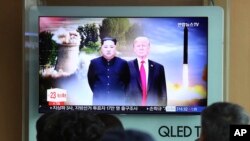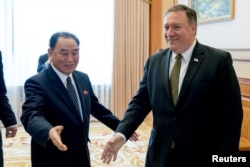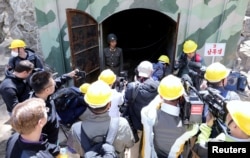President Donald Trump says he is in "no rush" to finalize a deal with North Korea and remove sanctions.
"I would love to take the sanctions off, but they have to be responsive too. It's a two-way street," Trump said during a lengthy White House news conference Wednesday.
He told reporters he has made more progress with North Korea than any other administration and that he still plans another summit with Kim Jong Un early next year.
Trump spoke just hours after Thursday's scheduled meeting between U.S. Secretary of State Mike Pompeo and senior Kim adviser Kim Yong Chol was called off.
Neither side gave any firm reason why the talks were postponed other than State Department deputy spokesman Robert Palladino calling it "purely a matter of scheduling."
"We're in a pretty good place right now. We are confident going forward," Palladino told reporters. "We're not going to be driven into artificial timelines."
The talks in New York were largely seen as paving the way for the second Trump-Kim summit. They first met in Singapore in June.
In announcing the now postponed meeting, the State Department said the two men would discuss "making progress on all four pillars of the Singapore Summit joint statement, including achieving the final, fully verified denuclearization" of North Korea.
Kim and Trump signed an agreement in June to rid the Korean Peninsula of nuclear weapons. However, the two sides have been at odds over the pace of Pyongyang's efforts to end its nuclear weapons program.
North Korea warned last week that it will consider reviving its nuclear weapons program if the United States fails to lift its crippling economic sanctions against the regime. North Korea is also seeking a peace treaty with the United States and South Korea that will formally end the 1950-53 Korean War that split the communist North from the democratic South.
The fighting ended with an armistice. The North and South never signed a peace treaty and are still technically at war.
Meanwhile, Russia has asked the U.N. Security Council to meet Thursday to discuss U.N. sanctions against the North.
It is unclear exactly why Russia called the meeting and what it wants to talk about.
Both Russia and China have said they believe the North should be rewarded for stopping missile tests and opening a dialogue with the United States.
Inter-Korean relations
While both the U.S. and South Korea want peace and stability on the Korea peninsula, there is a "fear" that fast-developing inter-Korean relations may get out of step with Washington, according to former U.S. officials and experts.
"The fear from America's perspective would be that the South Koreans might go too fast and agree to things that would involve, for example, our troops, our economic postures that we wouldn't be prepared to give [at this stage], without perhaps getting significant concessions on reductions of weapons testing," retired U.S. Ambassador Kristie Kenney said Wednesday.
"You could have a situation that South Korea and North Korea come to some kind of agreement and then suddenly there's an expectation that we would fall into line with that we would be willing to put scarce budget dollars into helping North Korea economically ... without having laid the groundwork or gotten enough concessions to make that possible," Kenney said at an Asia Society event that discussed U.S. policy toward Asia after the midterm elections.
"Keeping these things in sync is always a challenge," said former Assistant Secretary of State for East Asia and Pacific Affairs Danny Russel.
"It's a lot easier when the North Koreans are misbehaving, that tends to promote solidarity between Washington and Seoul," Russel said. "When the North Koreans are seemingly opening the door, then those differences in priorities and perspective can create tensions."
"The immediate priorities of reconciliation, family visit, and potential for infrastructure and trade between North and South [Korea] look a lot different from Seoul and from Washington as does the global non-proliferation agenda," he added.






